The EU-Turkey Summit in Varna Showed Dialogue with Erdogan Is Impossible
Adelina Marini, April 9, 2018
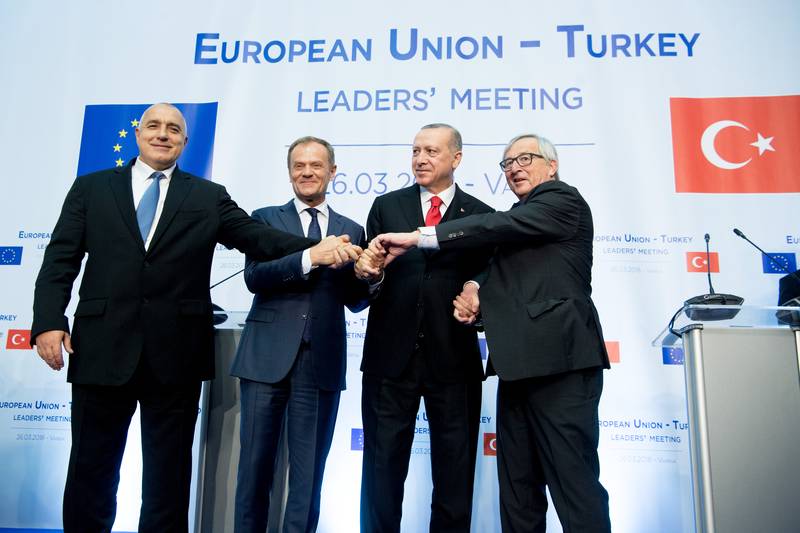 If 2017 was the year of common European defence, 2018 emerges as the year of common foreign policy. The worsening conflict in the Middle East, trade shoot-outs, tightening of the illiberal belt around the EU, as well as the transformation of key western allies into adversaries are factors that are pushing the Union to more frequently put geopolitics on top of the agenda and force it to unify its foreign policy. The spring EU summit was entirely geopolitical. At it, the four biggest risks for the Union at the moment have been outlined unequivocally: the actions of Presidents Trump, Putin, Erdogan, and Brexit. The Skripal case showed that Great Britain remains (for now) a loyal foreign policy ally of the Community.
If 2017 was the year of common European defence, 2018 emerges as the year of common foreign policy. The worsening conflict in the Middle East, trade shoot-outs, tightening of the illiberal belt around the EU, as well as the transformation of key western allies into adversaries are factors that are pushing the Union to more frequently put geopolitics on top of the agenda and force it to unify its foreign policy. The spring EU summit was entirely geopolitical. At it, the four biggest risks for the Union at the moment have been outlined unequivocally: the actions of Presidents Trump, Putin, Erdogan, and Brexit. The Skripal case showed that Great Britain remains (for now) a loyal foreign policy ally of the Community.
This case showed one more thing - Russia still has loyal friends in the EU whereas Turkey, a candidate country, can boast one - Bulgarian Prime Minister Boyko Borissov, who has lobbied for years for the Turkish interests in Brussels. In 2015, in the peak of the refugee crisis in Europe, he presented his colleagues in the European Council with a letter from Turkish President Recep Tayyip Erdogan, which offered establishment of security zones in Syria to prevent refugee flows. As an argument in support of the Turkish proposal Mr Borissov gave an apocalyptic forecast that Europe would otherwise be flooded by 10 million refugees.
Another situation when Boyko Borissov defended Turkish (but also Russian) interests was his lobbying in front of European Commission President Jean-Claude Juncker (Luxembourg, EPP) and European Council President Donald Tusk (Poland, EPP) for support for the Turkish Stream gas pipeline, which is, in fact, a geopolitical mutation of the South Stream project, suspended by Moscow. With the approaching of the Bulgarian presidency of the EU Council the Bulgarian prime minister developed strong geopolitical ambitions. Bulgaria will be hosting the first in many years EU summit with the Western Balkan countries, with the objective of the summit being to keep the Union's focus on the region. Apart from this mega-summit, Sofia wanted to mediate also for warming up of relations with another EU candidate - Turkey.
Both objectives are too big a spoon for the Bulgarian mouth but not according to Mr Borissov, who, in December, sharply criticised the European diplomacy. "First, we, as an EU, have to intervene very strongly in the geostrategic policy which is being led at the moment. You see President Trump, President Putin, Erdogan, the Arab League - they are all taking decisions that have consequences. Where are we?", he asked during the December European Council and recommended very fast external policy of the EU, including protection of EU borders "as once upon a time", whatever this means. Otherwise, he warned, the situation will become increasingly calamitous for whichever political party. "It is necessary to make coalitions of any type just to save the political space and to ensure governance", added Boyko Borissov who heads a coalition of anti-EU, pro-Russian, xenophobic parties.
From an ally Turkey is turning more and more into an adversary
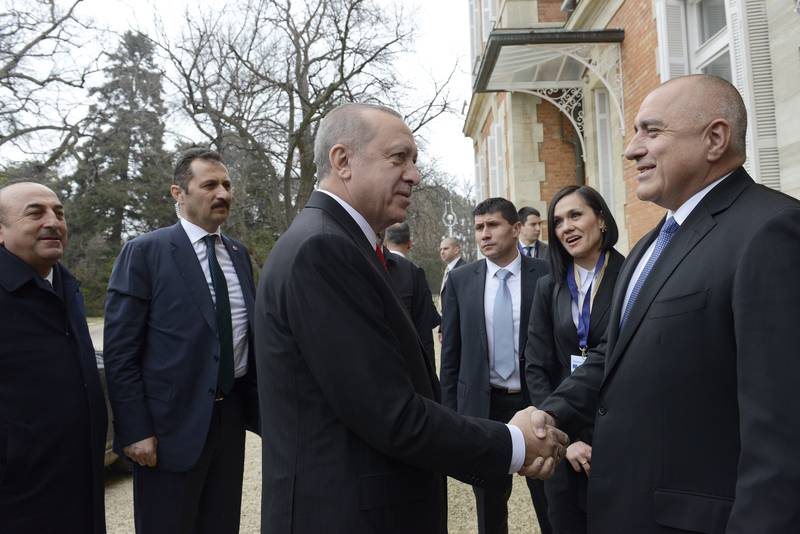 For quite some time Turkey has been causing the EU a headache. Negotiations with Ankara are frozen, relations are colder than ever, and the points of contact are less and less. The question whether it is time to reconsider the EU-Turkey relations is raised more and more often. This was one of the main issues of the European Council meeting last October, for which insisted Germany. Because of all Turkey's wrongdoings, like it's refusal to build rule of law, its influence in some Western Balkan countries, its attempts to mobilise the Turkish population in the EU itself last year for the Turkey referendum, its behaviour toward EU member states like Cyprus and Greece, and as of this year its direct clash with EU countries in Syria, the European Council asked the Commission to start thinking about reducing pre-accession funding for Turkey.
For quite some time Turkey has been causing the EU a headache. Negotiations with Ankara are frozen, relations are colder than ever, and the points of contact are less and less. The question whether it is time to reconsider the EU-Turkey relations is raised more and more often. This was one of the main issues of the European Council meeting last October, for which insisted Germany. Because of all Turkey's wrongdoings, like it's refusal to build rule of law, its influence in some Western Balkan countries, its attempts to mobilise the Turkish population in the EU itself last year for the Turkey referendum, its behaviour toward EU member states like Cyprus and Greece, and as of this year its direct clash with EU countries in Syria, the European Council asked the Commission to start thinking about reducing pre-accession funding for Turkey.
The leaders then discussed the possibility of suspending accession negotiations with Turkey but there was not sufficient majority for this, although everyone was sceptic about the future relations with this country. German Chancellor Angela Merkel nevertheless urged dialogue with Ankara to be maintained. "It's a bit bizarre, isn't it, to have 28 member states and the European Commission sitting at the very same table, talking about a country with which we've had an association agreement for a while, and have been talking about accession negotiations for many years. I think, when you talk about a partnership, you have to engage with your partner. We have to talk with Turkey. It's not easy. We have to be honest in talking to them", Ms Merkel added. Her statement suggests that the EU finds it hard to swallow that it is possible a candidate country to turn 180 degrees and practically turn against the Union.
The idea to organise a summit with Erdogan in Bulgaria did receive support but it was difficult. In February, Cypriot President Nikos Anastasiades and Greek Prime Minister Alexis Tsipras again raised the issue of Turkey's illegal invasion in the eastern Mediterranean and in the Aegean. President Tusk read out a declaration on behalf of the European Council in which he expressed the solidarity of the 28 with Cyprus and Greece, and appealed on Turkey to immediately suspend those activities. "I reiterate our support for the sovereign right of the Republic of Cyprus to explore and exploit its natural resources, in accordance with EU and international law, including the UN Convention on the Law of the Sea. These actions contradict Turkey's commitment to good neighbourly relations and their normalisation with all Member States", Donald Tusk said.
In February, it was expected to be confirmed whether there will be an EU-Turkey summit. The leaders, however, decided to postpone their decision for March. "We will assess at our March European Council whether the conditions are there to hold the Leaders' Meeting with Turkey in Varna on 26 March", Mr Tusk's statement read. On March 22-23, leaders reluctantly gave a green light for the summit to take place. This was another opportunity for the Bulgarian prime minister to outline a catastrophic forecast. "This is probably one of the last opportunities to remain in dialogue because relations have deteriorated so much in many places in the world, there are wars, aggressive actions, all dressed up in nice words, like freedom, democracy, justice and whatever but in fact people are dying. It is hardly the most pleasant thing for anyone to organise such summits but this is one of the few possibilities through dialogue to achieve some agreement", he said in Brussels back then.
The main objective of the summit to him was to reaffirm the migration deal with Turkey. "You quickly forget in Bulgaria but I remember very well that just a few months ago, during the campaign in Harmanli and in Ovcha kupel - the riots, the fires, the fights, the flags, the nationalists. This can re-emerge with a huge force and in thousands of times bigger scale. Everything in our region is very dangerous. There is a huge Muslim movement in the Balkans - mosques, Imams, Muftis. We are now living in peace and understanding, in tolerance, but this is until things get stirred up. You remember also the Revival Process. You remember after that Kosovo, then Crimea, the precedents in the region", the premier added. He was speaking of the migration riots in the refugee camps in the Bulgarian town of Harmanli in 2016 and in the Sofia district of Ovcha Koupel.
It was not clear in this statement what his fears are based upon. His threats of potential migration floods in Bulgaria, however, continue to be as unjustified as before. According to the latest report of the European Commission on the implementation of the European Agenda on Migration, the migration influx in the eastern Mediterranean route continues to be toward Greek islands. Since the beginning of the year, until March 6, 3 126 arrivals were registered on Greek islands. In the same period of last year, those registered were 2 689. Crossings from Turkey to Italy, Cyprus, Bulgaria and Romania are an insignificant number, the report says.
In the same time, the number of illegal crossings from Turkey to Greece across the land border are growing. These crossings increased by 80% in 2017 compared to 2016, and reached 5 500. This year (by March 4-5) 838 illegal crossing were detected, which is significantly more than the same period last year when they were 291. The report notes, however, that more than half of those who cross are in fact Turkish citizens.
Varna marked the beginning of the end between Turkey and EU
The dinner in Evksinograd showed the narrowing of the circle of common interests between the Union and Turkey. Until recently, external policy was part of this circle but with Turkey's involvement in Syria, as well as the brutal case with the six Turkish citizens in Kosovo, showed that the EU and Turkey have decreasingly less interests in this area. "We also expressed our concern with Turkey’s actions in Syria, in particular the situation in Afrin. Escalating violence and displacement in an already tragic and volatile situation must be avoided. And we recalled Turkey’s responsibility to ensure the protection of c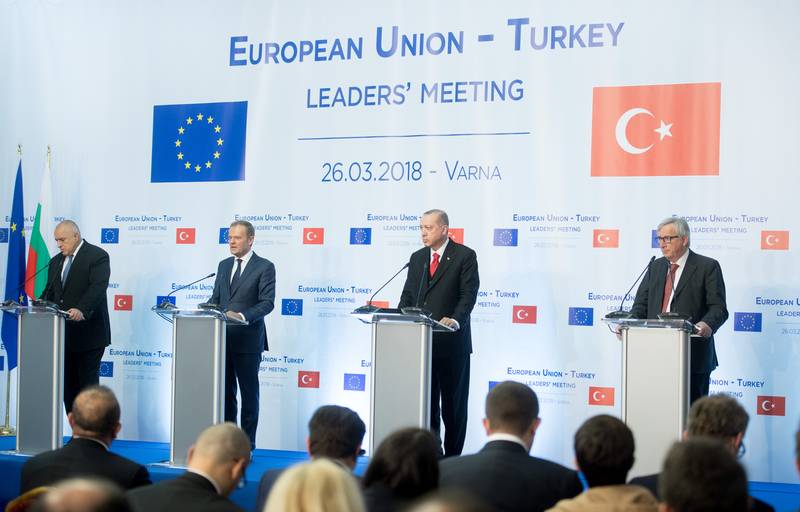 ivilians and the delivery of humanitarian assistance to all those in need", President Tusk said coldly after the meeting.
ivilians and the delivery of humanitarian assistance to all those in need", President Tusk said coldly after the meeting.
European Commission President Jean-Claude Juncker, too, noted that foreign policy had dropped out from this circle. In his words, EU's and Turkey's geopolitical interests intersect in the area of energy deliveries and security.
During the short press conference after the dinner in Varna, the two sides mutually exchanged ultimatums. Donald Tusk reminded Turkey that the status of a candidate country means a commitment to developing and maintaining the highest democratic standards, as well as keeping good neighbourly relations. Jean-Claude Juncker recalled that the "absolute must" to ensure progress in the dialogue and cooperation between EU and Turkey is improving relations with Greece and Cyprus. "This was a summit of mixed feelings but not of mixed messages", Mr Juncker concluded.
The Turkish president, too, gave an ultimatum and even a threat. He reminded that Turkey has been a candidate since 1963 and it is now 2018. However, he shied away from mentioning a thing or two about his commitments in this respect. He also reminded that he expected more money from the EU (3 billion euros) under the migration deal, and also progress on the Customs Union. "The EU is a strategic partner for Turkey and it would be a mistake to isolate Turkey from the process of partnership because Turkey is an important partner of strategic importance to the EU and is a large country with a young population. Not until the EU stops being overcritical, and particular certain members of the EU, we will not be able to engage fully in improving the relations", Mr Erdogan said.
It is time the EU to answer some important questions
The Varna summit on 26 March not only failed to produce any outcome but it was too early for such a summit. It was rather a personal favour for Prime Minister Borissov who desperately needs geopolitical manoeuvres to stabilise his government because he is surrounded by political competition that maintains warm relations with the Kremlin. For such a summit to make sense the EU needs to answer three key questions:
- How long it will legitimise Erdogan's regime and what future for the EU-Turkey relations?
- What the EU approach will be toward dictators from now on?
- Is there a plan B for the migration deal?
The fact that Turkey still is a candidate country legitimises Erdogan's regime and allows him to sit on Europe's table without merits. Until recently there were two reasons for this - common foreign policy interests, especially in the Middle East, and the migration deal. The former is obviously no longer. Then, remains the latter - fear of the possibility the Turkish president to suspend the migration deal and turn the tap on migration off. This is why the EU needs to draw a plan B which has to rest on a very clear assessment of the leverage the Union still has. There is no doubt that EU membership has long gone as a possibility.
In the same time, the Union holds a trump card in its sleeve and this is trade relations, which show that Turkey has much greater need of the EU than vice versa. The EU is Turkey's biggest trade partner. According to 2015 data, Turkey's trade with the EU was 40.6% thanks to the Customs Union. To the EU Turkey is the fifth most important trading partner which holds a 4% share of the Union's trade in 2015. EU's share in Turkey's foreign direct investments was 57.6%. Turkish investments in EU were 36.4%. 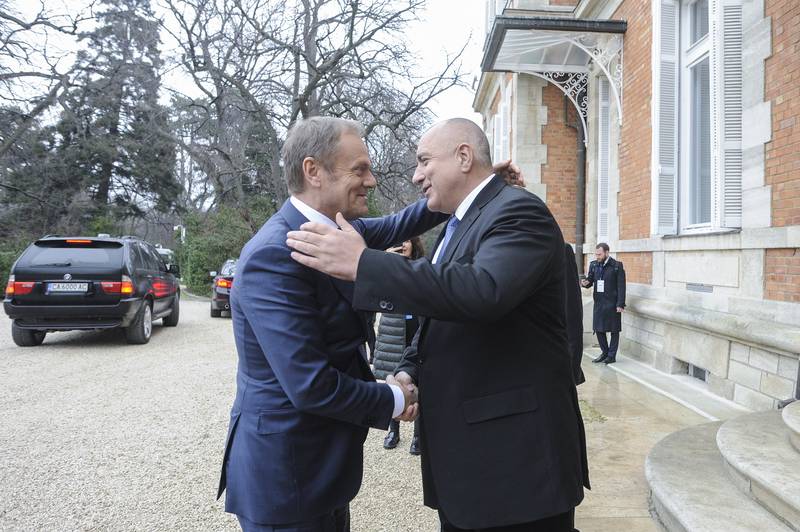 Again according to 2015 data, in Turkey there were 20 585 companies working with capital from the EU. This amounts to 43.6% of all companies created with foreign capital in the country.
Again according to 2015 data, in Turkey there were 20 585 companies working with capital from the EU. This amounts to 43.6% of all companies created with foreign capital in the country.
During the debate on Syria in the European Parliament in March, there were voices for sanctions against Turkey. This is a possibility that could be considered in case relations between the EU and Turkey deteriorated further. It will be a hard decision but experience shows that when you deal with dictators relations can only get worse as relations with Putin illustrate very well. In fact, worsening of relations with Putin and Erdogan, as well as the tightening of the illiberal belt around EU again raises the issue how to approach dictators from now on. Earlier this year, in Davos, German Chancellor Angela Merkel and French President Emmanuel Macron admitted that mistakes were made in Iraq and Libya.
The French President went even further by admitting that getting rid of tyrants returned as a boomerang to Europe. The Western Balkans summit in Sofia, as well as the EU-Turkey summit, are an occasion for the EU to radically reconsider its approach toward the surrounding world. The strategy on the Western Balkans is a step in the right direction but such a document is needed on Turkey too. Circumstances are forcing the EU to act faster than it wants and is capable of but the problems that the rupture between the EU and Turkey in foreign policy will create will echo again in the EU itself and will destabilise it additionally.
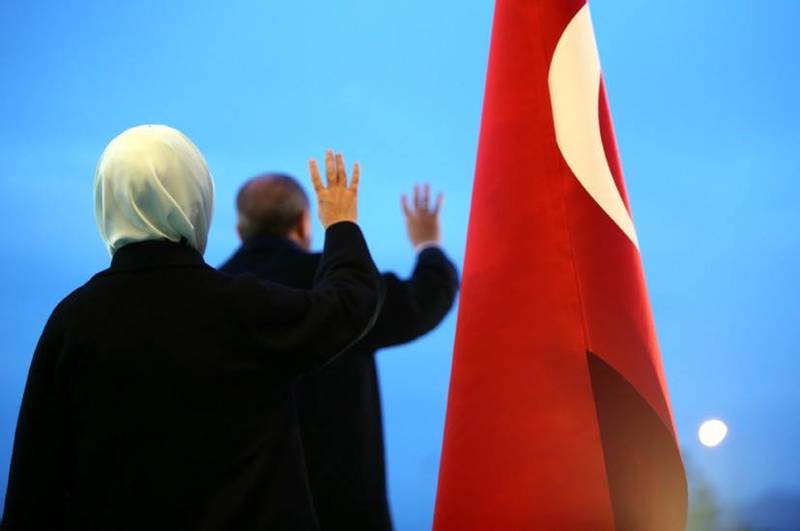 | © Turkey Presidency
| © Turkey Presidency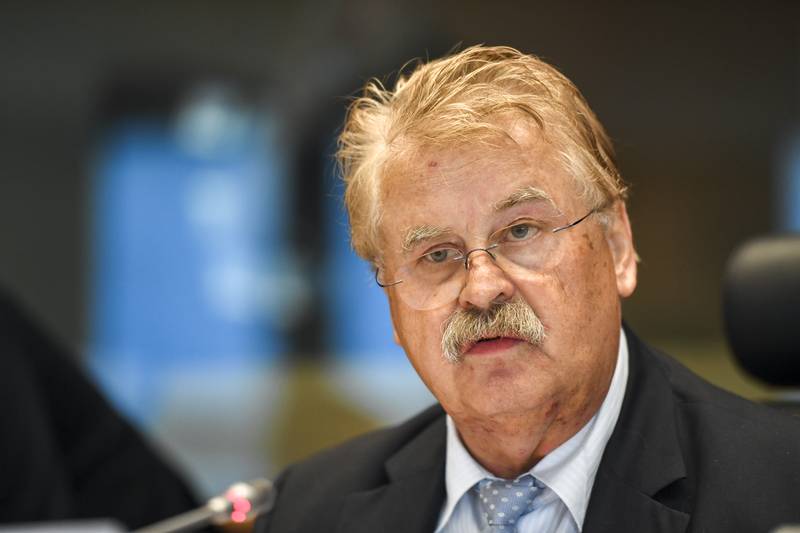 Elmar Brok | © European Parliament
Elmar Brok | © European Parliament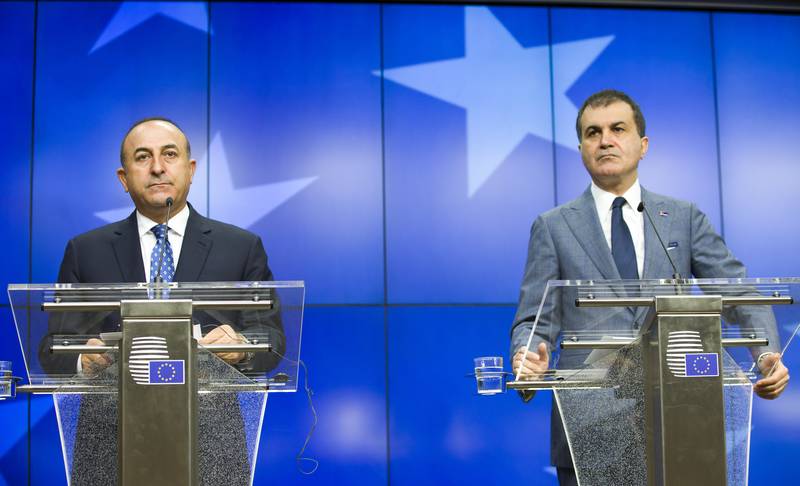 Mevlüt Çavuşoğlu, Ömer Çelik | © Council of the EU
Mevlüt Çavuşoğlu, Ömer Çelik | © Council of the EU